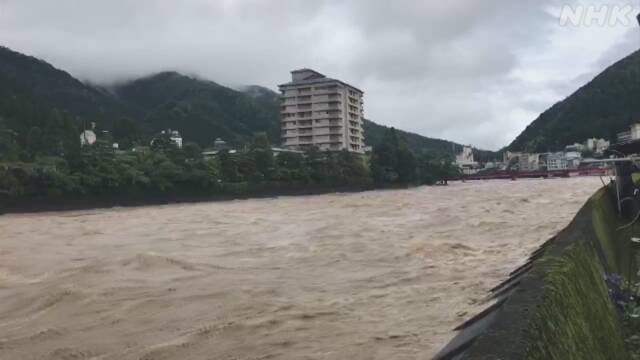Not able to enter the shelter... About 100 people "re-evacuate" Reduced capacity due to corona measures Gifu July 27, 16:51
In Gero City, Gifu Prefecture, where all areas were ordered to evacuate due to record heavy rains this month, the city reduced the number of evacuation shelters as a measure to prevent infection with the new coronavirus. I found out that I was "evacuating again".
Gero City issued an evacuation order to 32,571 households in 12,156 households throughout the city at 2:30 am on the 8th of this month, as there was a risk of landslides.
According to the city, the "Gero Civic Center" in the center became full in about an hour from the evacuation order, and the city called on people who evacuated by car to move to another evacuation center.
As a result, about 100 people were "re-evacuated" to the "Gero Exchange Center" about 2 km away, while it was still raining before dawn.
As a measure to prevent new coronavirus infections, the "Citizens Center" will reduce the number of people from 400 to 110 and leave a space between evacuees, and the city will send an e-mail to the residents in response to evacuation instructions. She was also instructed to evacuate to.
However, he explained that many people have come to familiar evacuation centers because he has always called for evacuation to the “Citizens' Center”.
Ichiro Obata, director of Gero City Office Gero Promotion Office, said, "I didn't know in advance that there were evacuation centers other than the civic center, and more people than expected came and left a problem. In such a situation, we would like to make known in advance which evacuation center to call for evacuation and try to prevent recurrence so as not to confuse the public."
The man forced to "re-evacuate"...
Yoichi Soga (55), who lives in the center of Gero city, headed to the evacuation center "Gero Civic Center" with his wife and elderly parents immediately after evacuation instructions were given.
However, the city officials explained that they could not enter the evacuation center anymore to avoid congestion by taking measures against the new coronavirus, and they were instructed to "re-evacuate" by car at the Gero Exchange Center.
There was no big confusion among the people who gathered, and they moved each other by helping each other, such as synergizing with cars.
Fortunately, the way along the way wasn't dangerous, but Mr. Soga said, ``When it comes to the elderly traveling alone in the rain, it's a big deal when we move late at night while it is raining. I thought back.
In addition, "I was surprised whether the new coronavirus will affect evacuation in the event of a disaster. I think the decision of the city was unavoidable, but in the future, the city and residents will discuss before the disaster occurs, and the evacuation centers will be divided into smaller groups. I think it is important to inform the evacuation destination."
Expert "problems that can occur anywhere in the country"
Associate professor Maki Koyama of Gifu University, who is familiar with regional disaster prevention, points out that “combining the new coronavirus and evacuation shelter is a common issue throughout the country, and the problem of “re-evacuation” can occur anywhere in the country”.
In addition, “Even if the residents are called for decentralized evacuation, they will evacuate to the same evacuation shelter in the event of an emergency in the event of an emergency. The administration will provide a place for residents to discuss in advance who and where to evacuate. You should have it ready."

